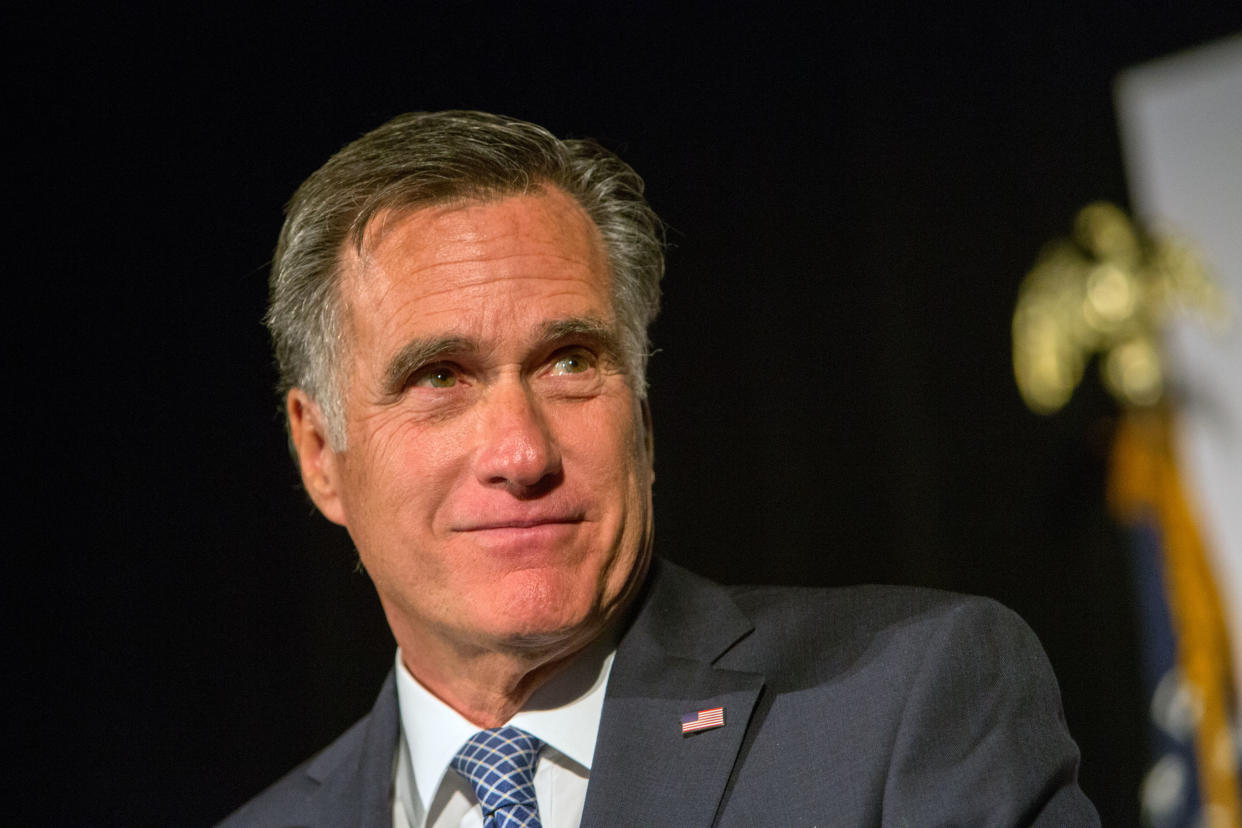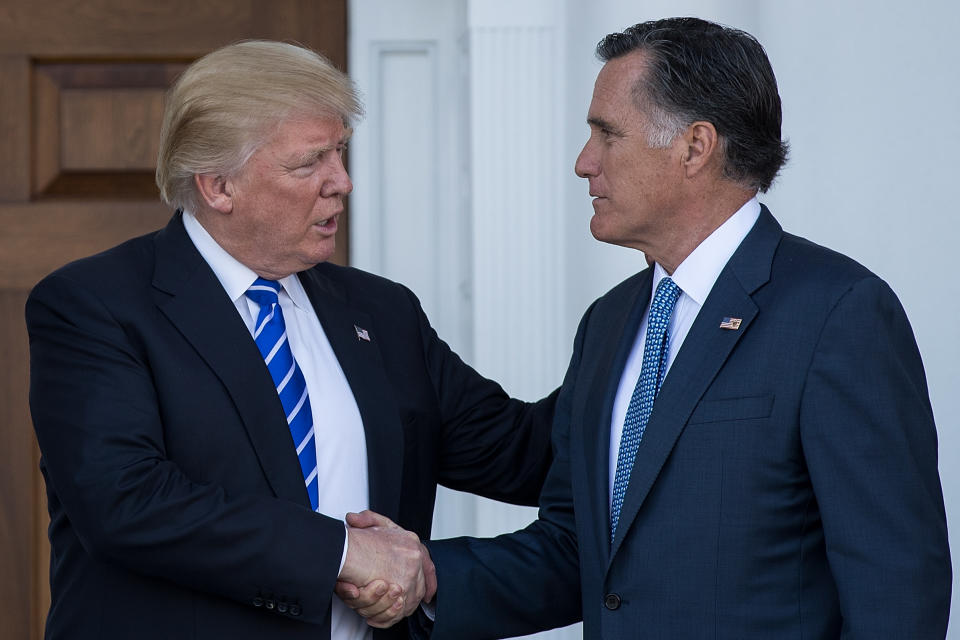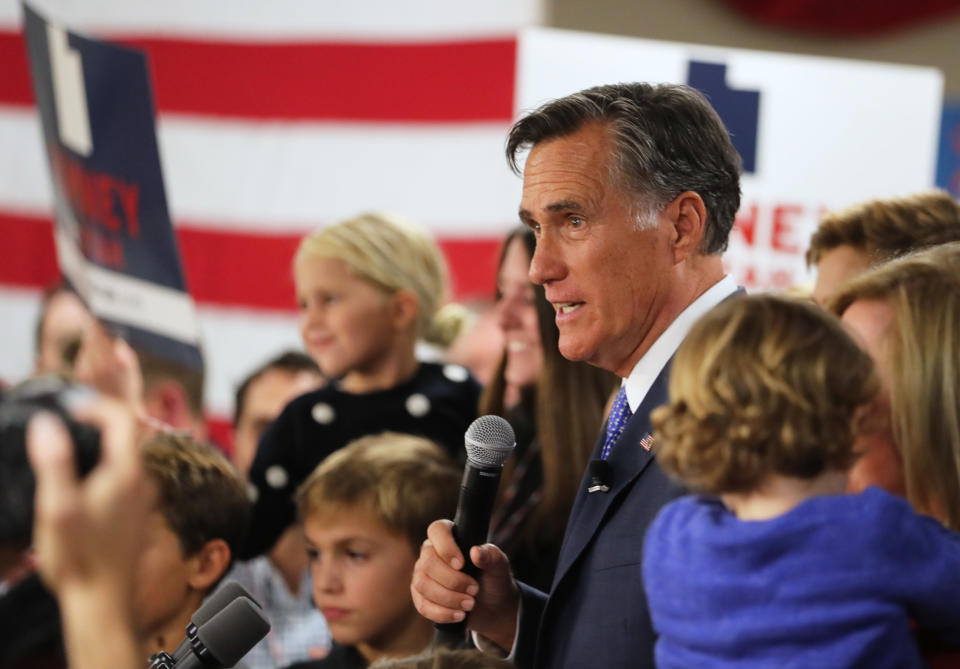Romney, laying down a marker against Trump, may have boxed himself in


WASHINGTON — It is possible to read too much into Mitt Romney’s attention-grabbing editorial takedown of President Trump this week, but it is also possible to read too little.
Romney enters Washington as a newly elected U.S. senator from Utah in a unique position. He is a Republican former governor of a liberal state, the Republican nominee for president in 2012 and a statesman in an era of disruption who has publicly opposed Trump but then also softened his criticisms.
Romney’s Washington Post op-ed, in which he declared that “the president has not risen to the mantle of the office,” immediately set off a round of speculation that Romney might be positioning himself to challenge Trump for the presidency in the 2020 Republican primary.
And there is no question that Romney’s entrance has increased the possibility of such a scenario. If Trump is vulnerable to a primary challenge, Romney’s aggressive move has made him an obvious candidate to mount one.
But it’s also true that this is getting laughably ahead of where things are right now. Today’s hyper-charged political landscape often makes a mockery of conventional wisdom and long-range planning.
In an interview with CNN’s Jake Tapper on Wednesday, Romney said, “I haven’t decided who I’m going to endorse in 2020. I want to see what the alternatives are.” Asked if he might be a candidate, he said, “No. You may have heard, I ran before.”
There are a number of things that would have to happen for Romney to be in a credible position to run. The best thing he can do is focus on the current moment and let circumstances play out. It helps in this case that he does not seem to need to run again for president.
And there are things we do know about the impact of Romney’s op-ed that help illuminate why he did it. It was an act of both aggression and commitment.
Romney’s inner circle is adamant that the GOP’s 2012 nominee won’t run for president again. Of course, that can be both an accurate snapshot of Romney’s state of mind today, and can also be subject to change.
Romney’s essay was a marker, a “stake in the ground,” as one Romney adviser said. Romney stepped forward to claim the mantle of a Republican Party leader who is willing to speak out, forcefully and prominently, against Trump.

“Mitt Romney, with this op-ed, has now emerged as the most important Republican voice against Donald Trump — and he has the institutional influence to make it matter,” Pete Wehner, a White House adviser to former President George W. Bush, told me.
Romney’s timing is impeccable. Special counsel Robert Mueller is expected to release the findings of his investigation into Trump’s campaign and administration very soon. If that report is incriminating enough to trigger serious consideration in the Republican-controlled Senate about voting in favor of impeachment, Romney would be a key voice in that debate.
In that scenario, if Trump were to go down, the GOP would be without a leader, and Romney would be an obvious choice to fill the void. Ohio Gov. John Kasich, who will leave office this month and who ran for president in 2016, is also angling for that role if the opportunity presents itself.
But Romney’s op-ed was also an act of commitment in that he has now locked himself into an adversarial relationship with Trump, rather than giving himself room to accommodate the president. Romney has limited his own flexibility and narrowed the potential roads he could travel in Trump’s Washington.
Romney has guaranteed that every time Trump does something controversial, there will be pressure on Romney to speak up. And on controversial legislation, there will be an expectation that Romney buck the White House if he disagrees.
One of the biggest knocks against Romney in the past has been that he lacks core convictions and is too willing to make decisions based on political expediency. One Romney adviser cast his op-ed as “speaking his mind as he believes he was elected to do, even if it’s not the best thing for him politically.”
There is some risk to Romney’s decision, but there are also political pressures that argue in favor of this approach. The most obvious one is that Romney represents a state that is among the most unfriendly to Trump among conservative-leaning states in the country.
Wehner, who has also been a prominent critic of the Trump presidency, said that Romney is “a man of decency and integrity” but also noted that “there’s no political disincentive for him to give voice to that decency and integrity.”
Romney, the governor of Massachusetts from 2003 to 2007, is popular in his new adopted home state of Utah. He is arguably America’s most famous Mormon, and Utah is where the Church of Latter Day Saints was born and is headquartered.
In large part because of the Mormon church’s own experience with religious persecution, many Mormons have never viewed Trump’s charged comments about racial and religious minorities favorably. A November voter survey found that 64 percent of Utah’s voters wanted Romney to stand up to Trump.
In light of all that, Romney is “more than willing to accept the incoming fire of Donald Trump,” Wehner said. That backlash came quite predictably on Wednesday in the form of an early morning tweet that was factually questionable. “I won big, and [Romney] didn’t,” Trump tweeted.

_____
Read more from Yahoo News:



